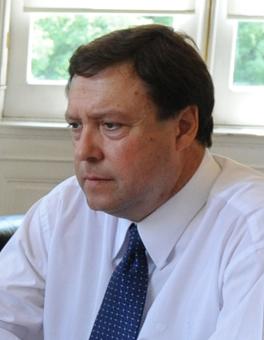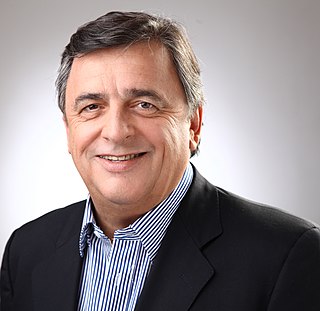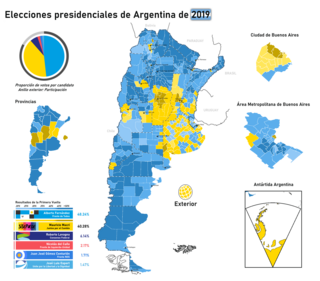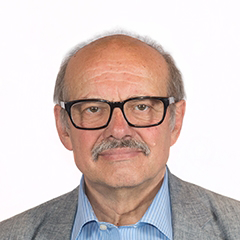
Civic Coalition ARI, until October 2009 known as Support for an Egalitarian Republic, is a centrist political party in Argentina founded in 2002 by Elisa Carrió.

Carlos Ernesto Soria was an Argentine lawyer and Justicialist Party politician who served as governor of Río Negro Province from December 10, 2011, until his assassination.

Miguel Ángel Pichetto is an Argentine lawyer and conservative Peronist politician. He is Auditor General of the Nation. He was National Senator for Río Negro Province for eighteen years and was the vice-presidential candidate of Juntos por el Cambio in the 2019 general election.

Miguel Ángel Saiz was an Uruguay-born Argentine politician latterly of the Radical Civic Union (UCR), who served as governor of Río Negro Province between 2003 and 2011.

Federal Peronism, also known as Dissident Peronism, is the faction or branch of either moderate, centrist or right-wing Peronism, that is currently identified mostly by its opposition to Kirchnerism, the left-wing faction of Peronism.

Alberto Weretilneck is an Argentine politician currently serving as governor of Río Negro Province since 2023. He previously held the same position from 2012 to 2019.

The Governor of Río Negro is a citizen of the Río Negro Province, in Argentina, holding the office of governor for the corresponding period. The governor is elected alongside a vice-governor. Currently the governor of Río Negro is Alberto Weretilneck.

Mario Raúl Negri is an Argentine Radical Civic Union (UCR) politician and lawyer. He was a National Deputy for Córdoba Province from 2011 to 2023, leading the UCR parliamentary bloc during most of his tenure. In addition, he was a member of the Council of Magistracy appointed by the Chamber of Deputies from 2017 to 2018.

General elections were held in Argentina on 27 October 2019, to elect the president of Argentina, members of the national congress and the governors of most provinces.

The Legislature of Entre Ríos is the local legislature of the Argentinian province of Entre Ríos. It is a bicameral body, comprising the Chamber of Deputies of Entre Ríos, and the Senate of Entre Ríos. It is one of eight bicameral legislatures in the country.

Arabela Marisa Carreras is an Argentine teacher and politician. She was Governor of Río Negro Province since from 2019 to 2023, the first woman to hold the post. From 2017 to 2019 she was the province's Minister of Tourism, Culture and Sports. She also served as a provincial legislator and as councilwoman in her hometown, San Carlos de Bariloche.

Together We Are Río Negro is a provincial political party in the Río Negro Province of Argentina. It was formed in 2015 as an electoral coalition to back the candidacy to the governorship of incumbent Alberto Weretilneck; it was later officially registered as a political party.

Martín Ignacio Soria is an Argentine lawyer and politician, who served as a Minister of Justice and Human Rights of Argentina from since 29 March 2021 to 10 December 2023. Having previously served as a member of the Argentine Chamber of Deputies elected in Río Negro Province, Soria was designated to succeed Marcela Losardo following her resignation.

Normán Darío Martínez is an Argentine politician. A member of the Justicialist Party, Martínez served as a National Deputy representing Neuquén Province from 2016 to 2020, and later as Secretary of Energy in the Ministry of Economy, in the administration of minister Martín Guzmán, from 2020 to 2022.

Susana Graciela Landriscini is an Argentine economist, professor, researcher and politician, currently serving as National Deputy elected in Río Negro. A member of the Justicialist Party, Landriscini was elected in 2019 and currently sits in the Frente de Todos bloc.

Luis Di Giacomo is an Argentine psychiatrist and politician, currently serving as a National Deputy elected in Río Negro. A member of the regionalist Together We Are Río Negro party, Di Giacomo was elected in 2019 and currently sits in the Provincias Unidas inter-bloc.

Silvina Marcela García Larraburu is an Argentine politician, currently serving as a National Senator for Río Negro Province since 2013. She previously served as a National Deputy from 2011 to 2013, and as a provincial legislator in Río Negro.

Carlos Alberto Caserio is an Argentine politician, who was a National Senator for Córdoba Province from 2015 to 2021 and a National Deputy from 2013 to 2015. A member of the Justicialist Party, Caserio formed part of the Union for Córdoba regional alliance from 1998 to 2019. In the Senate, he sat with the Frente de Todos parliamentary bloc from 2019 to 2021.

María Emilia Soria is an Argentine lawyer and politician, currently serving as intendenta (mayor) of General Roca, Río Negro. She belongs to the Justicialist Party.


















